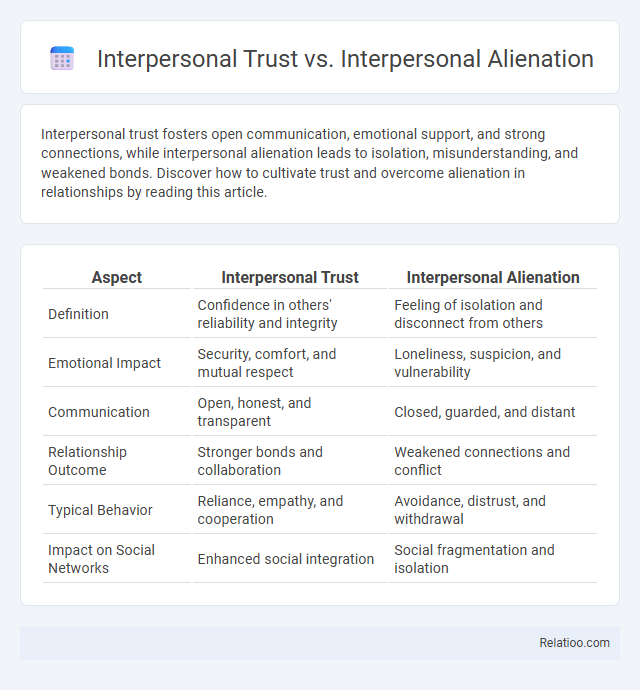Interpersonal trust fosters open communication, emotional support, and strong connections, while interpersonal alienation leads to isolation, misunderstanding, and weakened bonds. Discover how to cultivate trust and overcome alienation in relationships by reading this article.
Table of Comparison
| Aspect | Interpersonal Trust | Interpersonal Alienation |
|---|---|---|
| Definition | Confidence in others' reliability and integrity | Feeling of isolation and disconnect from others |
| Emotional Impact | Security, comfort, and mutual respect | Loneliness, suspicion, and vulnerability |
| Communication | Open, honest, and transparent | Closed, guarded, and distant |
| Relationship Outcome | Stronger bonds and collaboration | Weakened connections and conflict |
| Typical Behavior | Reliance, empathy, and cooperation | Avoidance, distrust, and withdrawal |
| Impact on Social Networks | Enhanced social integration | Social fragmentation and isolation |
Understanding Interpersonal Trust
Understanding interpersonal trust involves recognizing it as the expectation that others will act with honesty, reliability, and benevolence in social interactions, fostering mutual respect and cooperation. In contrast, interpersonal alienation occurs when individuals experience feelings of isolation, distrust, and emotional disconnection in relationships, undermining social bonds. General alienation extends beyond personal relationships to societal disillusionment, but interpersonal trust specifically counters these effects by building secure connections and enhancing social cohesion.
Defining Interpersonal Alienation
Interpersonal alienation refers to a psychological state where individuals feel isolated, misunderstood, or estranged from others, resulting in diminished emotional connection and social withdrawal. Unlike interpersonal trust, which fosters mutual understanding and cooperation, interpersonal alienation is characterized by feelings of loneliness and detachment within social relationships. This form of alienation often leads to a breakdown in communication and undermines social cohesion, distinguishing it clearly from general concepts of alienation that may encompass broader societal or existential disconnection.
Key Differences Between Trust and Alienation
Interpersonal trust is characterized by confidence in others' reliability and intentions, fostering positive relationships and cooperation, whereas interpersonal alienation entails feelings of isolation and emotional disconnection from others, leading to strained interactions. Trust promotes mutual understanding and collaboration, while alienation results in withdrawal and lack of engagement in social contexts. Understanding these key differences helps your relationships thrive by recognizing signs of trust-building versus alienation.
Psychological Foundations of Trust
Interpersonal trust is grounded in the psychological foundations of reliability, vulnerability, and positive expectancy within relationships, where individuals believe others will act benevolently and competently. In contrast, interpersonal alienation arises when those foundations erode, resulting in feelings of isolation, mistrust, and emotional disconnection. Understanding these dynamics helps you recognize how trust fosters social bonding, while alienation disrupts emotional support and psychological well-being.
Causes and Consequences of Alienation
Interpersonal alienation often stems from consistent unresponsiveness, betrayal, or lack of empathy, causing individuals to feel disconnected and isolated from others. This alienation leads to decreased social support, heightened emotional distress, and impaired communication, which undermine overall psychological well-being and social cohesion. Conversely, interpersonal trust fosters mutual understanding and cooperation, while interpersonal alienation disrupts relational bonds and contributes to feelings of loneliness and vulnerability.
The Role of Communication in Building Trust
Effective communication plays a crucial role in building interpersonal trust by fostering transparency, empathy, and mutual understanding between individuals. When communication breaks down, it can lead to interpersonal alienation, where feelings of isolation and disconnection arise due to misunderstandings or lack of emotional exchange. Your ability to engage in open and honest dialogue directly impacts whether relationships develop trust or spiral into alienation, highlighting the importance of communication skills in maintaining healthy social bonds.
Impact of Betrayal on Interpersonal Relationships
Betrayal severely undermines interpersonal trust, causing emotional distress and weakening the foundation of relationships that foster connection and cooperation. It often leads to interpersonal alienation, where individuals withdraw and create emotional distance, eroding communication and mutual understanding. Your ability to rebuild trust hinges on addressing these fractures openly, emphasizing empathy, and fostering consistent, honest interactions to reverse feelings of alienation and repair relational bonds.
Rebuilding Trust After Alienation
Rebuilding trust after interpersonal alienation requires consistent transparency, empathy, and open communication to address feelings of betrayal and emotional distance. Key strategies involve acknowledging past harms, validating emotions, and fostering shared experiences to restore connection and security. Effective trust restoration hinges on mutual commitment to vulnerability, active listening, and sustained positive interactions that counteract the effects of alienation.
Cultural Influences on Trust and Alienation
Cultural influences play a critical role in shaping interpersonal trust and alienation, as collective values and social norms determine the expectations and behaviors within relationships. High-context cultures, emphasizing harmony and indirect communication, often foster interpersonal trust through shared understanding, while low-context cultures may experience higher levels of alienation due to explicit communication and individualism. Cross-cultural variations in trust-building mechanisms and perceptions of alienation highlight the importance of cultural sensitivity in managing social connections and mitigating feelings of social exclusion.
Strategies to Foster Trust and Reduce Alienation
Building interpersonal trust requires consistent communication, empathy, and transparency to create a safe environment for open dialogue. Strategies to reduce alienation include active listening, validating feelings, and encouraging collaboration to strengthen connections and promote inclusion. Your commitment to these practices fosters stronger relationships and minimizes feelings of isolation or alienation.

Infographic: Interpersonal Trust vs Interpersonal Alienation
 relatioo.com
relatioo.com